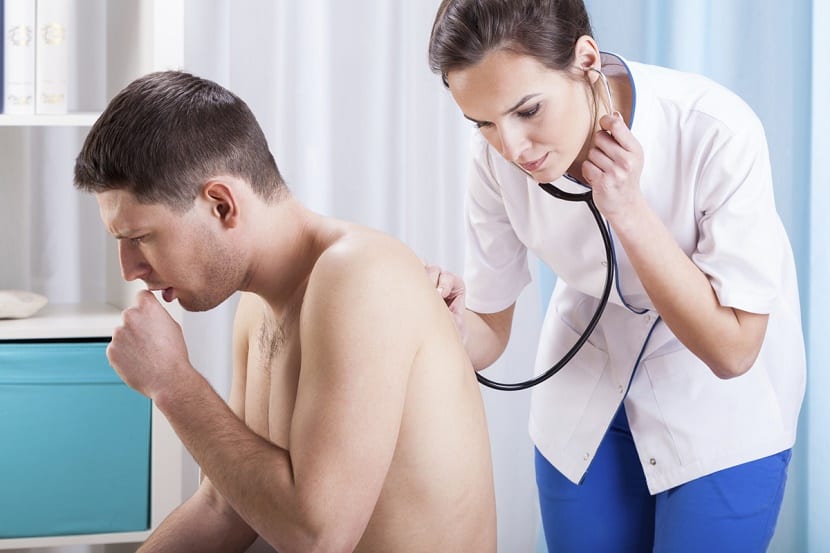
The so-called kissing disease is in medical terms an infectious mononucleosis caused by the Epstein-Barr virus, a herpes that is spread through saliva. Kissing disease in general is a mild ailment that may even go unnoticed or only show symptoms such as tiredness and weakness. You have to be attentive to know if you are really infected or not.
What is infectious mononucleosis (mono)?
Infectious mononucleosis, or mono, refers to a group of symptoms usually caused by the Epstein-Barr virus (EBV). It usually occurs in teenagers, but it can be contracted at any age. The virus is transmitted through saliva, which is why some people call it "the kissing disease."
People with mononucleosis often have high fevers, swollen lymph nodes, and a sore throat. Most cases of mononucleosis are mild and easily resolved with minimal treatment. The infection is usually not serious and usually clears up on its own in a month or two.
Kissing disease can also be spread through close contact with the infected person, Mononucleosis can be transmitted with a sneeze or cough… it is not necessary for people to kiss to have the disease. Sharing utensils such as cutlery increases the probability of contagion risk, which is why we must avoid close contact with the person who suffers from it or who you suspect may be suffering from it, as well as take extreme hygiene measures.
What are the symptoms of infectious mononucleosis?
Symptoms
The incubation period of the virus is the time elapsed since the infection is contracted and when you begin to have the first symptoms. It lasts for four to six weeks. The signs and symptoms of mononucleosis usually last one to two months.
Symptoms may include:
- Fever (comes in the form of spikes and can last for several weeks)
- sore throat
- swollen lymph nodes in the neck and armpits (80% of cases)
- headache
- fatigue and tiredness
- muscular weakness
- inflammation of the tonsils
- night sweats
- vomiting and nausea
- skin rashes (rare)
Occasionally, the spleen or liver may also become swollen, but mononucleosis is rarely serious or fatal. It can be complicated in some cases, especially in people with immune system problems, children or the elderly.
This virus is difficult to distinguish from other common viruses such as the flu. If symptoms do not improve after a week or two of home treatment while resting, getting enough fluids, and eating healthy foods, you will need to see your doctor again to find out exactly what steps to take to improve.
What causes mononucleosis?
The causes
Mononucleosis is caused by EBV. According to the Centers for Disease Control and Prevention (CDC), EBV is a member of the herpes virus family and is one of the most common viruses to infect humans worldwide.
The virus is transmitted as we have told you above, through direct contact with saliva from the mouth of an infected person and cannot be transmitted through contact with blood.
You can be exposed to the virus from a simple cough or sneeze, kissing, or sharing food or drink with someone who has mononucleosis. It usually takes four to eight weeks for symptoms to develop after you've become infected.
In adolescents and adults, the infection causes noticeable symptoms in 35 to 50 percent of cases. In children, the virus usually causes no symptoms, and the infection often passes on its own.
Who is at risk for mononucleosis?
Factors riesgo
The following groups are at increased risk of contracting the disease:
- youth between the ages of 15 and 30
- students
- internal doctors
- nurses
- caretakers
- people taking medications that suppress the immune system
Anyone who regularly has close contact with many people is at a higher risk of contracting the disease. This is the reason why both students and teachers can become infected in schools.
How is mononucleosis diagnosed?
Diagnosis
The doctor can generally diagnose mononucleosis if the patient has a fever, sore throats and ultimately, one or more symptoms that are associated with this disease. Age can also be a big factor to take into account since it is something that happens especially in adolescents, but it is worth remembering that it can happen to people of any age.
White blood cell count
Your doctor may order a blood test to confirm the diagnosis so they can count your white blood cells. A mononucleosis infection causes the body to produce more white blood cells than usual as it tries to defend itself from the foreign body. Although a high white blood cell count cannot confirm an infection with this particular virus, if there are other symptoms, the chances of suffering from it are quite high.
EBV antibody test
A test to detect whether you have the infection is usually sufficient to confirm infectious mononucleosis. The rapid mononucleosis test is a test that detects the presence of antibodies to EBV. Antibodies are proteins that your immune system will release naturally in response to a harmful substance called antigen.
Specifically, this test is performed to detect antibodies to EBV antigens. You may not have a detectable level of early antibodies to the disease. If this occurs, it may be necessary to repeat the test in 10-14 days to be sure.
How to prevent infectious mononucleosis?
Although there is no vaccine for this disease, the key is basically to prevent direct contact with people who have it. Also, you can follow some tips to reduce the odds:
- Wash your hands often
- Don't share your eating or drinking utensils
- Don't share your beauty products
- Try to sneeze carefully and stay away from whoever is coughing or sneezing
- Do not kiss a person who has been infected and has symptoms of the disease
How is mononucleosis treated?
The treatment
There is no specific treatment for infectious mononucleosis. However, your doctor may prescribe a corticosteroid medication to reduce throat and tonsil swelling. Symptoms generally resolve on their own in one to two months, so you'll need to be patient and take good care of yourself if you do catch it.
Treatment is aimed at relieving your symptoms but not at curing you. This includes the use of over-the-counter drugs that you can buy at pharmacies to reduce fever and home remedies to soothe a sore throat, such as gargling with water and salt. Other home treatments that can relieve symptoms include:
- rest
- sleep
- maintain good hydration with drinking water
- have hot soup
- using over-the-counter pain medicine
You should call your doctor if your symptoms get worse or if the pain you feel in your throat or also in the abdomen becomes too intense.
What are the possible complications of mononucleosis?
Complications icon
This disease is usually not serious. In some cases, people with mono get secondary infections like strep throat, added infections, or tonsillitis. In rare cases, some people may develop the following complications:
Enlarged spleen
You should wait at least a month before doing any vigorous activity or contact sports to avoid rupturing your spleen, which may be swollen from infection. Talk to your doctor about when you can return to your normal activities.
A ruptured spleen in people with mononucleosis is rare, but it is a life-threatening emergency for anyone. You should call your doctor immediately if you have this disease and have a sharp, sudden pain in the upper left part of your abdomen.
Inflammation of the liver
Hepatitis (inflammation of the liver) or jaundice (yellowing of the skin and eyes) can occasionally occur in people who have infectious mononucleosis.
Less common complications
Mononucleosis can cause some of these very rare complications:
- anemia, which is a decrease in the number of red blood cells
- thrombocytopenia, which is a decrease in platelets, the part of the blood that starts the clotting process
- inflammation of the heart
- complications that affect the nervous system, such as meningitis or Guillain-Barré syndrome
- swollen tonsils that can block breathing
If you consider that you have the infection and that there is no way for it to heal itself and that the symptoms are not resolving and you are even worse, then go to your doctor as soon as possible to assess your health.


